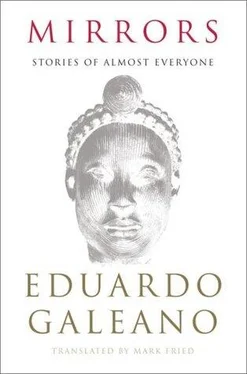Lord Elgin was not exactly an artist. As British ambassador a couple of centuries ago, he shipped these marvels home and sold them to his government. Since then, they sit in the British Museum.
When Lord Elgin filched what he filched, the Parthenon had already been devastated by weather and war. Erected to the eternal glory of the goddess Athena, it endured the invasion of the Virgin Mary and her priests, who eliminated several figures, rubbed out many faces, and mutilated every penis. Many years later came the Venetian invasion and the temple, used as a powder house, got blown to pieces.
The Parthenon was left in ruins. While the sculptures that Lord Elgin took were broken and remain so, they speak to us about what they once were:
that tunic is just a piece of marble, but in its folds sways the body of a woman or a goddess,
that knee walks on in the absent leg,
that torso, decapitated, bears an invisible head,
that bristling mane conveys the missing horse in full whinny, and
those galloping legs how it thunders on.
In the little there is, lies all that was.

They call him the father of medicine.
New doctors take their oath in his name.
Two thousand four hundred years ago, he cured and he wrote.
These are a few of the aphorisms born, he said, of his experience:
Experience can fool you, life is short, the art of treatment long, the moment fleeting, and judgment difficult.
Medicine, the most noble of all arts, falls far behind others thanks to the ignorance of those who practice it.
There is a circulation common to all, a respiration common to all. Everything is related to everything else.
The nature of the parts of the body cannot be understood without grasping the nature of the organism as a whole.
Symptoms are the body’s natural defenses. We call them diseases, but in reality they are the treatment for the disease.
Eunuchs do not go bald.
Bald men do not suffer from varicose veins.
May meals be your food, and food your medicine.
What cures one will kill another.
If a woman has conceived a boy, she has good color. If she has conceived a girl, then her color is poor.

In the time of Pericles, Aspasia was the most famous woman in all Athens.
This could be said otherwise: in the time of Aspasia, Pericles was the most famous man in all Athens.
Her enemies never forgave her for being a woman and a foreigner. To add insult to injury they saddled her with an unmentionable past and said that the school of rhetoric she ran was a breeding ground for girls of easy virtue.
They accused her of scorning the gods, an offense that might have cost her life. Before a tribunal of fifteen hundred men, Pericles took up the defense. Aspasia was absolved, although in his three-hour speech Pericles forgot to say that rather than scorning the gods, she believed the gods scorn us and spoil our ephemeral human joys.
By then, Pericles had already tossed his wife out of his bed and his house, and was living with Aspasia. He sired a son with her, and to defend the child’s rights he broke a law he himself had decreed.
Socrates interrupted his classes to listen to Aspasia, and Anaxagoras cited her opinions.
Plutarch wondered: “What artful power did that woman possess that allowed her to inspire philosophers and dominate the most eminent political figures?”

Of Sappho not much is known.
They say she was born twenty-six hundred years ago on the island of Lesbos, thus giving lesbians their name.
They say she was married, that she had a son, and that she threw herself off a cliff because a sailor paid her no heed. They also say she was short and ugly.
Who knows? We men do not like it when a woman prefers another woman instead of succumbing to our irresistible charms. In the year 1703, the Catholic Church, bastion of male power, ordered all of Sappho’s books burned.
A handful of poems survived.

In his garden in Athens, Epicurius spoke out against fear. Against fear of the gods, death, pain, and failure.
It is simply vanity, he said, to believe the gods care about us. From their bastion of immortality, their perfection, they offer neither prizes nor punishments. Why fear the gods when we fleeting, sorry beings merit no more than their indifference?
Death is not frightening either, he said. While we exist, death does not, and when death exists, we no longer do.
Fear pain? Fear of pain is what hurts most, and nothing gives more pleasure than pain’s departure.
Fear failure? What failure? Nothing is enough if enough is too little, but what glory could compare to the delight of conversing with friends on a sunny afternoon? What power equals the urge to love, to eat, to drink?
Let’s turn our inescapable mortality, Epicurius suggested, into an eternal feast.

Greek democracy loved freedom but lived off its prisoners. Slaves, male and female, worked the land,
built the roads,
mined the mountains in search of silver and stone,
erected the houses,
wove the clothes,
sewed the shoes,
cooked,
washed,
swept,
forged lances and shields, hoes and hammers,
gave pleasure at parties and in brothels,
and raised the children of their owners.
A slave was cheaper than a mule. Slavery, despicable topic, rarely appeared in poetry or onstage or in the paintings that decorated urns and walls. Philosophers ignored it, except to confirm it as the natural fate of inferior beings, and to sound the alarm. Watch out, warned Plato. Slaves, he said, unavoidably hate their owners and only constant vigilance can keep them from murdering us all.
And Aristotle maintained that military training for the citizenry was crucial, given the climate of insecurity.
SLAVERY ACCORDING TO ARISTOTLE

One who is a human being belonging by nature not to himself but to another is by nature a slave; and being a man he is an article of property, and an article of property is an instrument. . The slave is a living tool, just as a tool is an inanimate slave.
Hence there are by nature various classes of rulers and ruled. For the freeman rules the slave, the male the female, and the man the child.
The art of war includes hunting, an art which we ought to practice against wild beasts and against men who, though intended by nature to be governed, refuse to submit; for war of such a kind is naturally just.
Bodily service for the necessities of life is forthcoming from both, from slaves and from domestic animals alike. The intention of nature therefore is to make the bodies of freemen and of slaves different.
WATCH OUT FOR THE BACCHANALIA

In Rome, too, slaves were the sunshine of every day and the nightmare of every night. Slavery stoked the empire’s life and its dread.
Читать дальше



















